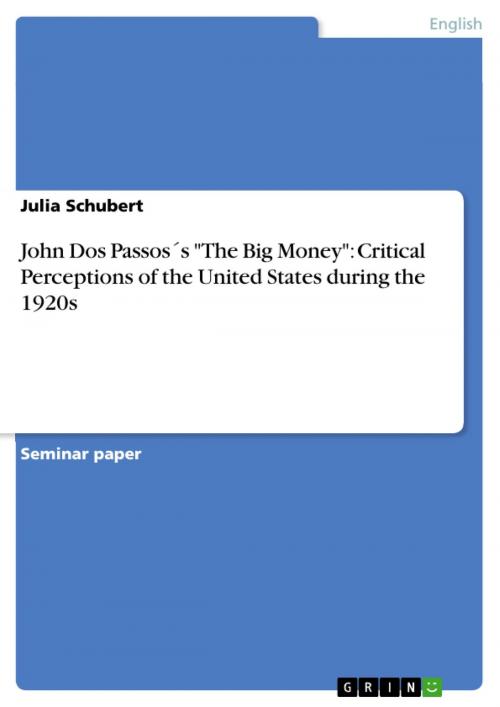John Dos Passos´s 'The Big Money': Critical Perceptions of the United States during the 1920s
Nonfiction, Entertainment, Drama, Anthologies| Author: | Julia Schubert | ISBN: | 9783638513739 |
| Publisher: | GRIN Publishing | Publication: | June 27, 2006 |
| Imprint: | GRIN Publishing | Language: | English |
| Author: | Julia Schubert |
| ISBN: | 9783638513739 |
| Publisher: | GRIN Publishing |
| Publication: | June 27, 2006 |
| Imprint: | GRIN Publishing |
| Language: | English |
Seminar paper from the year 2005 in the subject American Studies - Literature, grade: 1,7, Martin Luther University (Institut für Anglistik und Amerikanistik), course: Modernism and Its Others: U.S.-American Literature and Culture in the 1920s, 18 entries in the bibliography, language: English, abstract: When the French philosopher, critic and writer Jean-Paul Sartre concluded an essay on the American novelist John Dos Passos in 1938 with the words 'I regard Dos Passos as the greatest writer of our time' it was quite clear that the author of the trilogy U.S.A. had joined the class of the most important and influential writers in American literature. The three novels of the trilogy are critical documents and portraits of the history and life of the American nation during the first three decades of the 20 th century. U.S.A. is a social and political work that is shaped by the stylistic experimentation of the author who treats art in the service of history 1 and therefore leaves him in a literary outstanding position. This term paper aims to explain and justify this position of Dos Passos by examining and analyzing The Big Money which was the final novel of U.S.A. First of all, this work will give an overview and assessment of the trilogy as a whole to facilitate an analytical insight into its meaning and purpose. Secondly, the four different styles of narration will be discussed. The third part of the paper will deal with The Big Money: What is the historical context of the novel? Who are the main characters? Finally, the themes of the novel will be shortly summarized in the fourth part of this paper. [...]
Seminar paper from the year 2005 in the subject American Studies - Literature, grade: 1,7, Martin Luther University (Institut für Anglistik und Amerikanistik), course: Modernism and Its Others: U.S.-American Literature and Culture in the 1920s, 18 entries in the bibliography, language: English, abstract: When the French philosopher, critic and writer Jean-Paul Sartre concluded an essay on the American novelist John Dos Passos in 1938 with the words 'I regard Dos Passos as the greatest writer of our time' it was quite clear that the author of the trilogy U.S.A. had joined the class of the most important and influential writers in American literature. The three novels of the trilogy are critical documents and portraits of the history and life of the American nation during the first three decades of the 20 th century. U.S.A. is a social and political work that is shaped by the stylistic experimentation of the author who treats art in the service of history 1 and therefore leaves him in a literary outstanding position. This term paper aims to explain and justify this position of Dos Passos by examining and analyzing The Big Money which was the final novel of U.S.A. First of all, this work will give an overview and assessment of the trilogy as a whole to facilitate an analytical insight into its meaning and purpose. Secondly, the four different styles of narration will be discussed. The third part of the paper will deal with The Big Money: What is the historical context of the novel? Who are the main characters? Finally, the themes of the novel will be shortly summarized in the fourth part of this paper. [...]















